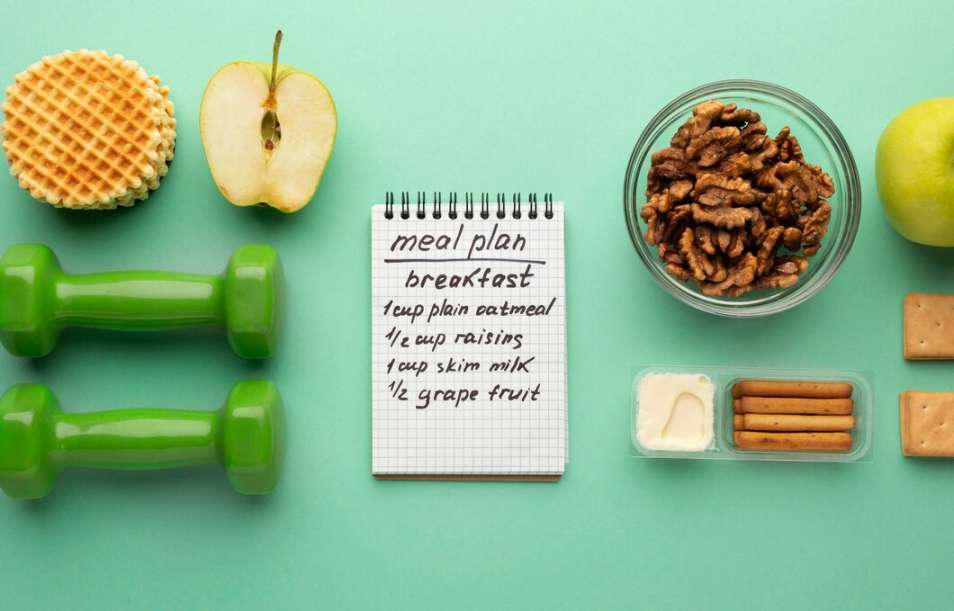10 healthy habits to follow everyday

- 10 healthy habits to follow every day: The small decisions you make every day have a long-term impact on your health and wellness. In a world where chronic diseases like heart disease and obesity are on the rise, it’s more important than ever to make efforts to improve your overall health.
- Simple habits like eating well, getting enough sleep, doing regular physical activities, and learning how to deal with stress can help you feel at your best by improving your mental health and well-being, protecting your heart health, and keeping your BMI within an acceptable range. For the same reason, bad habits will hurt your health in the long run.
- Wellness is a never-ending quest because the science behind healthy living is always changing. You might have good habits that work well for you at one point in your life and then stop. Making changes as needed is very important. You should always know what kinds of choices work best for you.
How to Implement Healthy Habits into Your Lifestyle
- Understanding the significance of healthier behaviours will help you feel more driven to implement them for yourself. Discuss with your doctor where your health is weak and how you may improve things. As you begin to incorporate a new habit into your routine, pay attention to how you feel every day.
- With time, you’ll begin to notice results, making it simpler to stay motivated. It will be difficult at first, but try to remember why you started in the first place and remember that the advantage of living a long, healthy life is worth every bit of effort required.
- While food and exercise are essential components of a healthy lifestyle, there are numerous other practices that can considerably improve your general well-being. And, as with any habit, consistency is essential.
10 healthy habits to follow every day

1. Maintaining a Healthy Diet
- Chronic disorders, including high cholesterol, high blood pressure, obesity, and diabetes, are all too widespread these days. Developing the habit of eating a healthy, well-balanced diet can make all the difference in preventing certain diseases from occurring in the future.
- Healthy foods are full of nutrients and help you feel full, so you’re less likely to indulge in junk food impulsively. The goal is to eat a lot of different healthy foods and to focus on eating more whole foods instead of heavily processed, packaged foods that are high in sodium and saturated fat.
- There are many different ways to eat healthy, and many of them work. Because everyone’s ideal diet is different, you might have to try a few different things before you find the one that works best for you.
- Plant-based diets, Mediterranean diets, and ketogenic diets are some examples of healthy diets.
a) Plant-based diet
A plant-based diet entails solely ingesting foods derived from plants (i.e., no animal products). A vegan diet excludes all meat, dairy, and eggs. This type of diet can be quite healthy for some people, reducing the risk of heart disease and diabetes. Plant-based diets also necessitate the use of a variety of healthy foods, such as vegetables, fruits, nuts, seeds, and legumes.
b) Dietary Guidelines for a Mediterranean Diet
The Mediterranean diet is often regarded as one of the healthiest diets, particularly for reducing heart disease. This diet emphasises eating a variety of food types while limiting how much and how frequently you consume them. A Mediterranean diet often includes a high intake of whole grains, nuts, seeds, legumes, fruit, and vegetables.
c) The ketogenic diet
The ketogenic diet is a popular diet that consists of eating a high-protein diet while limiting carbs and sugars. This diet is occasionally used to lose weight, although it can have some harmful side effects. By no means is there a one-size-fits-all diet. If you have a specific health issue, your doctor can help you choose the healthiest diet for you.
2. Regular Physical Activity

- Regular exercise benefits you not only physically but also mentally. Exercise benefits the heart, lowers blood pressure, builds muscle, and strengthens bones. It also stimulates the release of endorphins, the brain’s “feel-good” chemicals, which promote a happy mood and reduce negative mental health symptoms such as anxiety and sadness. Exercise is a fantastic stress-relieving habit. It can also help to encourage better sleep, increase vitality, and even fight the effects of ageing.
- Exercise can help you avoid gaining weight or keep it off once you’ve lost it. The higher the intensity of the activity, the more calories you burn.
- It’s great to go to the gym regularly, but don’t stress if you can’t make it every day. Any type of exercise is better than none at all. The benefits of exercise can be gained by just being more active during the day. Instead of taking the elevator, take the stairs. It’s important to be consistent.
- Consistent exercise can make you feel better about your appearance and yourself, which can boost your confidence and self-esteem. It improves the efficiency of your circulatory system by providing oxygen and nutrients to your tissues.
3. Getting Enough Water Every Day

Staying hydrated by drinking enough water can help improve your mood, thoughts, and even your kidney health. Since water makes up most of your body, it makes sense that getting enough will help you work well.
The following are some of the health benefits of drinking water:
- Keeping you hydrated so you can exercise.
- Promoting healthy bowel movements and regular urine, which help in the removal of waste and toxins from the body.
- Maintaining joint lubrication
- Keeping a healthy body temperature
- Help in the maintenance of a healthy weight.
It’s possible that you need more water than you think. A while ago, it was said that adults should drink eight glasses of water every day. Now, that number may change depending on your weight. Talk to your doctor about how much water you should drink every day. When you are sick, pregnant, or breastfeeding, for example, you need to drink more water than usual.
4. Using Safe Sun Protection
- Simply by going about your daily activities, you are probably getting an important amount of sun exposure if you live in a state that receives a lot of sunshine. Continuous exposure to the sun can cause damage to the skin and, over time, may even result in the development of skin cancer.
- When you want to protect your skin from the sun, you should apply sunscreen on a daily basis. Be sure to apply additional sunscreen and reapply it frequently if you are going to be out in the sun for an extended period of time.
5. Following Good Sleep Hygiene

- There are many benefits associated with getting a good night’s sleep. Through the enhancement of your metabolism, mental health, and immune system, as well as the prevention of weight gain and other issues, sleep is beneficial to your entire body and overall health. One component of good “sleep hygiene” is getting an adequate amount of one’s sleep.
- In addition to that, it is important to make sure that you are getting an adequate amount of peaceful sleep every day. This may occur if you wake up in the middle of the night or if your habit of flipping back and forth prevents you from getting enough deep sleep. Both of these scenarios are possible possibilities.
- On the other hand, just changing your routine before going to bed is not sufficient to produce healthier sleep patterns. One more effective method for enhancing the quality of sleep is to expose oneself to sufficient sunlight during the day.
- In addition, it is essential to discover specific methods that can help your brain relax before going to bed and throughout the day. It may be beneficial to engage in activities such as mindfulness meditation and yoga.
6. Getting Frequent Exposure To Nature and Fresh Air
- Going outside and getting some fresh air is an important aspect of living a healthy lifestyle. Breathing in fresh air helps to clean your lungs, improve your mood, lower your heart rate, raise your energy, and aid in digestion.
- Spending time in nature promotes a healthy lifestyle by improving moods and reducing stress hormones. Make it a point to spend time in a park, on nature trails, or at the beach on a regular basis to help relieve stress and enhance your health.
- Even if there is no grass around, spending time in the sun and breathing fresh air may make you feel better in both mind and body.
7. Doing Yoga or Other Mind-Body Exercises

- The practice of yoga is not only an effective method of physical activity and healing, but it also contributes to the development of a connection between the mind and the body. With Yoga , you don’t need to be an expert; there are multiple ability levels, which is one of the many reasons why yoga is so wonderful.
- Yoga benefits include weight loss, better energy levels, greater vitality, improved heart health, injury prevention, and improved sports performance.
- Meditation and breathwork have numerous well-known advantages, ranging from reduced stress, anxiety, and sadness to increased focus and vitality.
- It is more about making space to connect to your breath and higher self than it is about any particular technique.”
Methods for doing it:
- Choose a comfortable seat, sit tall, and close or soften your eyes.
- Inhale deeply, four times through your nose.
- For four counts, hold your breath.
- Exhale for a total of four counts.
- Repeat for a total of 20 minutes.
8. Adding Omega-3 Fatty Acids to Your Diet
Omega-3 fatty acids promote brain and heart health. Taking an omega-3 supplement on a daily basis or eating foods that naturally contain them can help promote overall health by preventing heart disease. Omega-3-fatty acid-containing foods include:
- Nuts and seeds
- flaxseed
- walnuts
- fish
- eggs
Before using any dietary supplements, consult with your doctor to ensure that they are safe for you.
9. Intermittent fasting
- Before starting intermittent fasting, consult with your doctor. You can choose a daily method that limits daily meals to one six- to eight-hour period each day. Although some people find it easy to stick to this pattern in the long run.
- According to Mattson’s studies, it can take two to four weeks for the body to adjust to intermittent fasting. You may feel hungry or irritable while you adjust to your new regimen. However, he observes that research volunteers who make it through the adjustment stage are more likely to remain with the plan because they notice they feel better.
- According to research, intermittent fasting does more than just burn fat. Mattson goes on to say, “When changes occur with this metabolic switch, it affects the body and brain.”
- One of Mattson’s investigations, which was published in the New England Journal of Medicine, revealed information concerning a variety of health benefits linked to the practice. These include living a longer life, having a slimmer body, and having a sharper mind.
- “Numerous effects can be observed during intermittent fasting that can protect organs against chronic conditions such as type 2 diabetes, heart disease, age-related neurodegenerative diseases, and numerous cancers.
10. Make a To-Do List Every Day
Make a to-do list for the day or the next day at the start of the day or when the night comes to an end. This list should include short-term goals and/or tasks that you need or should do, as well as tasks that will bring you closer to a larger goal you want to attain. Your list might include everything from working out to cleaning the house, doing extra work, working on a side business, or whatever else you wish to include. A to-do list keeps you focused and on track, and it gives you a sense of purpose.
Increased productivity: By making a to-do list at the beginning of each day or week, you may identify your most essential activities and prioritise them rather than wasting time on less important ones. Focusing on the appropriate topics allows you to finish assignments faster rather than waste time on unimportant diversions.
Time saved: Creating a to-do list ensures that you always know what to work on and when to work on it, saving you the time it takes to find out the next steps. To improve your time management skills, outline time expectations and realities at the start and finish of each assignment.
Decreased stress: To-do lists reduce stress by providing a clear roadmap to your goals. Decluttering your workspace and centralising all tasks provides you with better control over your workload. Stress and anxiety are lessened as a consequence.
conclusion
Taking steps to maintain a healthy lifestyle will improve your quality of life and may even prevent the development of a chronic disease. Consistency is critical to making habits stick and achieving the desired results. Eating a balanced diet and exercising frequently are both great methods to maintain your health. It is critical to recognise that having a healthy lifestyle demands effort, but the effort is well worth it. It has never been more important to take precautions to stay healthy and avoid illness because we now live in a culture where chronic disease is increasing. A healthy lifestyle is an ongoing adventure that will require trial and error to perfect. Based on your present state of health, your doctor can help you evaluate what types of lifestyle modifications will benefit you.


